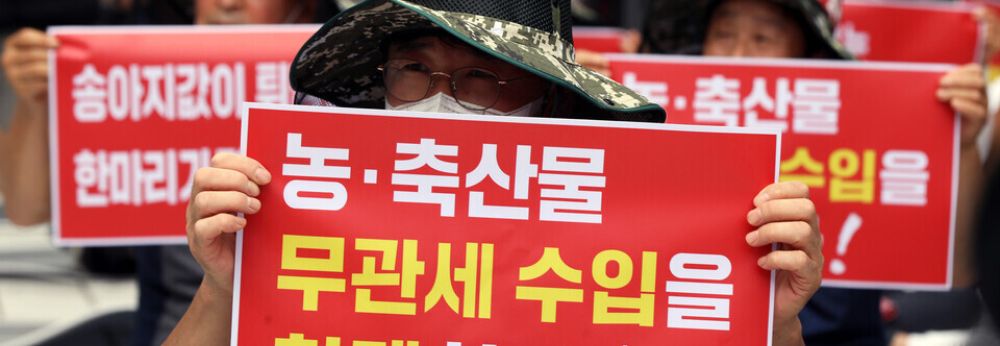Korea: Peasant movements denounce tariff reductions, call for measures to enhance Food Sovereignty

According to reports from the Korean Peasant Leagues’ news outlet, IKP News, peasant opposition to tariff reductions is growing in South Korea. The report highlights the influx of imported agricultural products, totaling tens of thousands of tons over the past two years due to lower tariffs. Initially intended as short-term remedies, these tariff reductions have quickly become entrenched, effectively operating as a permanent supply policy. Moreover, even imported fruits, which face no direct domestic competition, have witnessed significant tariff reductions under the guise of price stabilization.
As the World Trade Organization (WTO) prepares for its 13th Ministerial Meeting in Abu Dhabi next week, scrutiny of tariff reduction measures outlined in the Agreement on Agriculture intensifies. These measures, often employed to improve market access for transnational businesses, are increasingly under the microscope for their impact on food sovereignty and rural economies. Data from the UN Food and Agriculture Organization (FAO) reveals that Korea’s grain self-sufficiency rate dipped to 19.3 percent in 2020, marking the first time it fell below the 20-percent threshold. Contrastingly, this rate stood at 30.9 percent in 2000, indicating a significant shift towards grain imports, which now constitute 80 percent of domestic consumption.
Concerns are mounting over the decline of traditional fruit markets, which relied on quarantine measures, in the face of the surge in imported agricultural products. The adverse effects of the government’s misaligned agricultural policies are expected to disproportionately impact domestically produced agricultural and livestock goods and the farmers who cultivate them. With media attention amplifying these concerns, there is growing anxiety that the Yoon Suk-yeol administration’s singular focus on price stability, the primary rationale behind tariff reductions, could precipitate agricultural disintegration and rural collapse.
Peasant movements accuse the government and politicians of hesitating to embrace and disseminate the concept of food sovereignty, with instances of ambiguity and misuse of terminologies being widespread. The surprising mention of strengthening food sovereignty by then-presidential candidate Yoon Suk-yeol in 2022 quickly unraveled upon closer inspection. Notably, the Grain Management Law amendment, despite its uncertain prospects, was vetoed by the government, bypassing the expansion of domestically produced non-glutinous rice and soybeans.
In April 2023, a report by IKP News highlighted the Korean peasant movements’ denunciation of the government’s rejection to amend the Grain Management Act, warning of dire consequences for the country’s food sovereignty and rice farmers’ livelihoods. President Yoon Suk-yeol exercised his presidential veto for the first time in April 2023 to reject a bill aimed at revising the Grain Management Act, which mandated the government to purchase excess rice yields.
The proposed amendments, supported by the opposition party and Korean peasant movements, aimed to introduce minimum measures to secure food sovereignty and stabilize farm management in the country. These included establishing a legal basis for the temporary implementation of the paddy field crop cultivation support program to address rice supply fluctuations proactively. Peasant movements advocate for measures such as mandatory market isolation, a production adjustment system, and expanded paddy field crop cultivation to stabilize rice farmers’ management, enhance food self-sufficiency, and ensure food security. Proponents argue that these measures would prevent instances of steep rice price crashes, such as the one experienced in 2021, from recurring.
Peasant movements stress that the stable production of rice, the nation’s staple food, holds invaluable importance, and it is the government’s responsibility to ensure its stable production through legal and institutional mechanisms. They emphasize the need to establish institutional mechanisms to ensure stable production of the nation’s staple food, including a minimum guaranteed price for rice production, as essential preparations for food crises.
This article has been prepared with inputs from reports by Han Woojoon, Kim Suna and Won Jaejeong for IKP News (한국농정신문).
This post is also available in Français.
